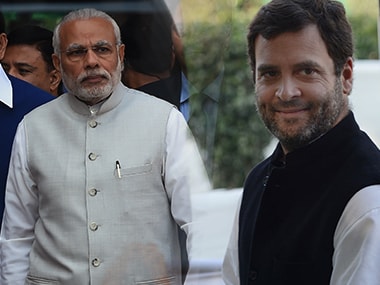On 1 March, Rahul Gandhi informed us that he’s flying away to Italy for the weekend to play Holi with his 93-year-old granny. That’s a step up for someone who goes abroad unannounced. Charming though the gesture was, it catches in a nutshell why the BJP wins and the Congress seemingly can’t. It’s about hunger.
Leadership isn’t just holding rallies, running to temples, taking Twitter potshots or giving sound bites to the media. It is equally about facing the camera in defeats, owning up to losses, explaining the mandate and prepping up the party rank and file for the next challenge. There’s always a next battle to be won. Defeat not only tests the mettle of a leader, it makes the leader.
Rahul cut a sorry figure as a Congress president who was busy vacationing abroad just when his party required him to be present. Congress has received a drubbing in the North East — a traditional sphere of influence — and Rahul left it for his colleagues to do all the answering.
The party has just been wiped out of Tripura and Nagaland where it had a legacy, presence and vote bank. It was unable to form a government in Meghalaya despite emerging as the single largest party. Instead of facing the questions, Rahul opted to stay back in the cool climes of Europe in company of friends and family, away from the heat and grime of electoral politics.
Rahul seems unable to process the fact that it is no longer his prerogative alone to shape the trajectory of his political career. A party president cannot pretend to be a freelancer. Rahul’s actions, therefore, send a message that he is an escapist, unwilling to confront the realities and incapable of bearing the burden of his responsibilities. As someone who covets the prime minister’s chair, his conduct doesn’t inspire confidence.
The reaction to the North East debacle finally came on Monday afternoon, nearly 48 hours later.
The Congress party respects the mandate of the people of Tripura, Nagaland and Meghalaya.
We are committed to strengthening our party across the North East and to winning back the trust of the people.
My sincere thanks to each and every Congress worker who toiled for the party.
— Office of RG (@OfficeOfRG) March 5, 2018
Rahul’s boilerplate response contrasts sharply with the reaction from West Bengal, where doughty chief minister Mamata Banerjee dismissed the BJP’s wins as “inconsequential” and blamed Tripura’s Manik Sarkar government for failing to put up a fight. Faced with the BJP’s advances in its backyard, Mamata vowed to target the Red Fort and oust Narendra Modi in 2019.
Mamata’s words might appear as posturing, and that is the whole point. BJP’s acquiring of Tripura, which houses a sizeable Bengali population, gives a new dimension to the challenge posed by the BJP to the TMC in Bengal, where it has slowly emerged as the chief Opposition. Mamata’s attempt, therefore, was to simultaneously deny the BJP the psychological advantage of an important victory and instill confidence among her party workers. Faced with a challenge from the saffron juggernaut, the West Bengal chief minister is telling BJP that she won’t yield an inch of space. This hunger defines Mamata. It has made her the BJP’s toughest rival.
Congress’s lack of hunger was evident in the way it sought to pick and choose its battles. Even as the bugle sounded in the North East, Rahul kept Karnataka in his crosshairs. The party president was conspicuous by his absence, except one Burberry-fashioned show in Meghalaya. Assembly polls aren’t due in Karnataka until April-May, but instead of focusing on the three north eastern states (especially Tripura where it had a sizeable base), Rahul was visiting temples or holding rallies in Karnataka.
This created an impression that for the Congress, Karnataka was more important than the North East. It not only spoke of misplaced priorities but may also be perceived as a slight to the North East – a communication blunder. It also indicated that even under a new president, the Congress’s culture of not taking every election seriously and not according the same importance to all states continues. The Congress paid a heavy price for indifference. It wasn’t just about the zeroes that it harvested in Nagaland and Tripura. It managed to hand the momentum back to the BJP which had been discomfited with a sub-par performance in Gujarat and a string of by-election defeats.
Momentum matters in politics. For a behemoth like the BJP, even more so. The wins in the North East, where the party tread into uncharted territories is likely to energise the rank and file ahead of sterner tests in Karnataka, Rajasthan, Madhya Pradesh and Chhattisgarh. It also gives the NDA a chance to counter the narrative that the Modi magic is fading. The wins also project the BJP as a pan-Indian party that now straddles the length and breadth of India, striking partnerships with unlikely allies and drawing votes from communities and faiths among which it had no presence before.
The BJP can now legitimately claim the mantle of India’s ‘default’ ruling force that not only manages to capture, but stay in power against severe headwinds. It can do so because Narendra Modi and his lieutenant Amit Shah have instilled a hunger that was earlier missing in its ranks.
In Tripura, for instance, the BJP and RSS had to patiently build the party block by block from scratch. It fought a bloody battle to capture the political space against a Left that uses violence to curb ideological and political opposition. The BJP was able to do it because of a hunger that rages in its belly despite being in power in 21 states.
It is this hunger that drove the BJP to a win in Gujarat where the party had to fight bitter odds of anti-incumbency, trader backlash, farmer discontent and caste uprising. The merit of that win hasn’t yet been fully understood. This hunger enables the BJP to fight every election as if its entire existence depends on it. In this hunger game, Rahul’s Congress is no match.
Published Date: Mar 05, 2018 18:48 PM | Updated Date: Mar 05, 2018 18:48 PM














